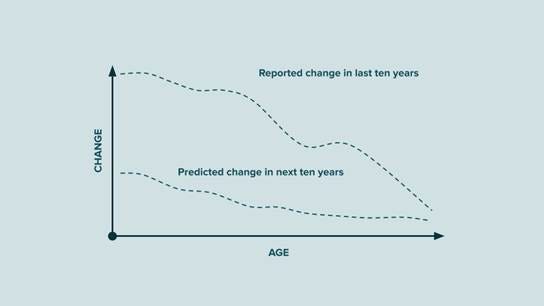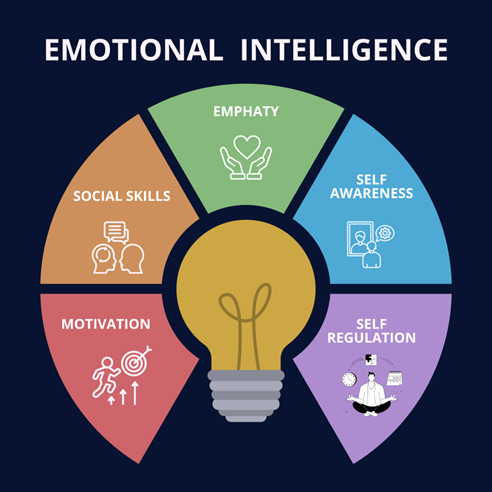Whether or not you are now married, you probably will be, or at least together with a partner for an extended time, and you should therefore be aware of how many big changes are going to happen in that relationship. I wasn’t, and mostly everyone I know wasn’t aware of those changes, so we all caught off guard. But you don’t have to be caught off-guard. You can begin to understand now that all long-term relationships, including yours, will change, and you can begin to think about how you will deal with those changes even before they begin to happen. That’s why I am writing about this subject in this post. Maybe I can help you prepare and not be caught off guard. Let’s go through the inevitable changes one step at a time.
Individuals Always Underestimate How Much They Will Change in the Future
Neuroscientists and psychologists agree that individuals, even those who know how much they’ve changed over the past few years, always underestimate how much they will continue to change in the coming years. It comes down to the difference between something you’ve experienced versus something you haven’t. You can probably remember many things you’ve learned over the past ten years, but when it comes to your next ten years, you most likely assume there won’t be any changes worth talking about. This is a common human bias called “the end of history” bias. You assume you’re now a pretty much “finished product”.
Why is that? Well, you know no one can predict the future. That’s obvious. When you do, you tend to exaggerate the positive things you like to think about, and underestimate the negative. This is normal. I remember doing this as a teenager. I would sit at my drawing board in my bedroom and imagine myself being a famous and successful syndicated newspaper cartoonist. I would be doing things I like doing and making a lot of money doing it. It never occurred to me how hard it was to create a popular cartoon strip, sell it to a syndicate, and keep it going every day.
If Individuals Always Keep Changing, How Do Their Changes Affect Their Relationships?
It’s kind of obvious, isn’t it? If both people change as they keep learning and adapting to the changing world they live in, doesn’t that mean their relationship has to go through some kind of change too? How that relationship will change depends on how individuals change, and how those changes impact the bonds of their beginning relationship—what attracted them enough to get married or committed to each other in the first place. Let’s consider what their original, important need satisfactions might have been, and how their new pressures might disrupt those early bonds. Let’s now call any long-term relationship a “marriage”.
After the honeymoon is over, every marriage seems to lose some of the romantic love sharing it began with. For example:
Less time to be together and communicate with each other. Keeping up with the practical demands of work or managing a home, especially one with children, can limit these critical opportunities to connect and share your evolving lives. A continuing loss in time together can lead to a lost sense of companionship and intimacy.
Disagreements about important decisions such as financial decisions, can result in conflicts. If these conflicts cannot be managed, they can lead to behavior that can damage the relationship and even result in divorce.
In summary, psychologists view marriage as a dynamic entity that evolves through various stages and changes over time, requiring adaptation, communication, and ongoing effort to maintain a healthy and fulfilling relationship.
Maintaining A Positive, Healthy Marriage Begins with Knowing Yourself
Dr. Eric Berne, the Canadian Psychiatrist who developed Transactional Analysis in the 1970’s often said, the first step in becoming an objective and responsible adult is becoming self-aware. In my opinion, this is another way of saying we should try to build our Emotional Intelligence (EQ). Emotional intelligence is defined as the ability to understand, use, and manage your own emotions in positive ways to relieve stress, communicate effectively, empathize with others, overcome challenges, and build strong relationships. It encompasses recognizing, understanding, and managing your own emotions, as well as recognizing, understanding, and influencing the emotions of others. Basically, humans are emotional animals with occasional outbursts of logical thinking. This is why I have come to believe EQ is the most critical skill needed to achieve any kind of success in life.
How self-aware are you? If you think of all the critical parts, and you’re totally honest with yourself, you may be able to say you are self-aware. If you’re not sure, or you haven’t thought much about this subject, you probably aren’t, and that means you are very likely to have trouble maintaining a positive and healthy married relationship. I’ll be honest with you, I wasn’t self-aware before my first marriage, and I don’t think my first wife was either. Our marriage lasted over 20 years but it ended in divorce, with anger, confusion, and two very unhappy children. I’m convinced that not being self-aware is a major reason, if not the most important reason, for divorce in America. Today, approximately 41% of first marriages in the United States end in divorce. But it doesn’t seem that much is learned from these first-marriage divorces, because the divorce rate is much higher for second-marriages (60-67%) and third-marriages (73%). I sincerely hope you are self-aware, or want to become more so.
Specifically, What Can You Do to Make Your Marriage Work?
At this point, I’d like to turn to Dr. John Gottman, a man considered by many psychologists as the nation's foremost researcher on marriage and divorce. I will summarize his many groundbreaking conclusions from his research studies and then provide one of his videos below, so you can hear and see him present his research results on over 2,000 marriage couples in Seattle, Washington.
Key Research Conclusions:
Marital Stability and Divorce is Highly Predictable
Gottman's research, which began in the 1970s, focused on understanding the dynamics of couples, especially during conflict, to predict marital stability and the likelihood of divorce. He could predict divorce with 90% accuracy, based on key behaviors and communication patterns observed between couples, and as described in more detail with the Four Horsemen.
The Four Horsemen
He identified four key negative interaction patterns that can predict divorce: Criticism (focusing on your partner’s personality flaws rather than specific behaviors), Defensiveness (responding to criticism with counter-accusations or self-justification rather than taking responsibility), Contempt (statements or actions that convey superiority and disdain, like sarcasm, name-calling, eye-rolling), and Stonewalling (withdrawing from the interaction, becoming emotionally unavailable, and refusing to engage).
Masters vs. Disasters
Gottman's research identified patterns in couples' interactions, distinguishing between "masters" of relationships (those who are happily married long-term) and "disasters" (those who experience conflict or separation). Masters as adept at building and maintaining healthy, lasting relationships, while Disasters struggle with communication, negativity, and conflict resolution. Masters focus on building a positive, supportive environment, while Disasters tend to exhibit criticism, defensiveness, contempt, and stonewalling
Gottman Therapy Method
His research forms the basis of the Gottman Method Couples Therapy, which aims to improve relationships by addressing conflict, increasing intimacy, and fostering understanding.
His video below explains these concepts as well as his research methods in his Seattle studies. I strongly recommend taking the time to view his entire video below:
I hope you will think about his findings and not hesitate to seek professional help if you are having marriage difficulty or seek to develop your own emotional intelligence. Even a small first step can make a real difference in your life.







